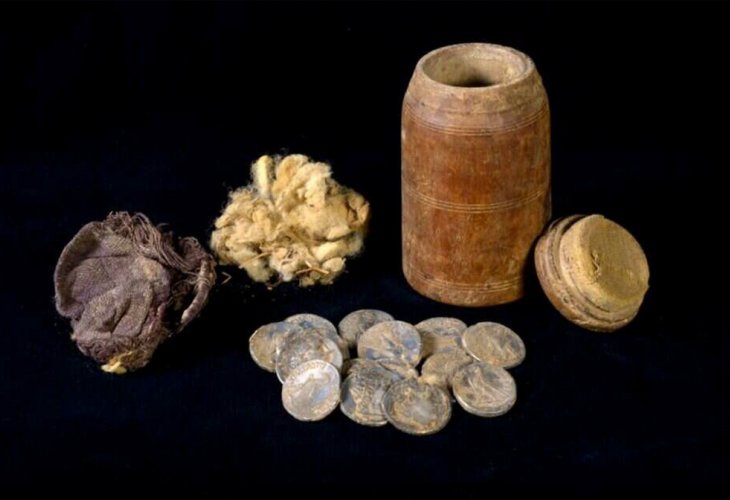Echoes of Ancient Rebellions: A Remarkable Discovery from Judah's History
A wooden box containing 15 silver coins was found hidden in a cave at the Darja Stream Nature Reserve. Researchers speculate that the owner may have fled there to escape the soldiers of Antiochus IV.
 (Photo: Dafna Gazit, Israel Antiquities Authority)
(Photo: Dafna Gazit, Israel Antiquities Authority)A Rare Find in the Judean Desert: A wooden box containing 15 silver coins, dating back to the era of Greek rule in the land of Judah, was discovered in the caves of Muraba'at at the Darja Stream Nature Reserve.
Researchers estimate that the cache was placed in the cave around 2,200 years ago, during the Second Temple period, shortly before the Maccabean revolt against the Greeks.
According to the researchers, "this is a unique find, unparalleled in its kind, providing the first clear archaeological evidence that the caves of the Judean Desert served as a refuge or hideout for Jewish rebels or refugees during the days leading up to the Maccabean revolt or in its early stages."
The box was uncovered during excavations in May and has been transferred to the Hasmonean Museum in Modi'in, where it will be displayed to the public.
The discovery of the ancient treasure is part of an excavation and survey project of the Judean Desert caves conducted by the Israel Antiquities Authority, the Archaeology Staff Officer of the Civil Administration, and the Ministry of Jerusalem and Heritage. During the excavations, an ancient wooden box was found in a crevice inside a cave, unlike any other treasure in the land.
The lid of the container was opened, revealing that its upper section was filled with loose soil and small stones compressed up to the rim. Beneath this layer, a large piece of purple-dyed wool fabric was found. The fabric covered 15 silver coins arranged at the bottom of the box, interspersed with pieces of sheep wool.
This unified group of silver tetradrachm coins were minted by Ptolemy VI, King of Egypt, who ruled concurrently with his uncle Antiochus Epiphanes IV, the ruler of the Kingdom of Judah at the time. One coin had an Aramaic inscription, "Shalmai –Shalmai" written on it.
Dr. Eitan Klein, the Israel Antiquities Authority's treasure researcher, together with Dr. Gabriela Bijovsky, a coin expert with the Authority, stated: "It's fascinating to imagine who the person was that fled to the cave and hid his private property there, intending to return for it. It appears that due to the events of the period, the individual perished in battle and never returned for his treasures, which awaited us for nearly 2,200 years. This find is unparalleled, offering the first clear archaeological evidence that the caves of the Judean Desert served as sites for Jewish rebels or refugees in the days preceding or in the early stages of the Maccabean revolt."
Dr. Klein suggests that residents of Israel hurriedly hid their belongings in the desert following the looting of the temple vessels by Antiochus IV and the destruction of Jerusalem's walls in the years leading up to the Hasmonean revolt. Another explanation offered by Dr. Klein is the religious decrees imposed on the Jewish people in 167 BCE.
Eli Eskosido, Director of the Israel Antiquities Authority, commented: "The discovery of the coin hoard, which we are unveiling to the public as part of Israel's Heritage Week events, excites the imagination and connects us directly to those days – here and now. These are the Chanukah coins that the Antiquities Authority gifts to the people and State of Israel. I invite the public to join and volunteer in our excavation operation at the Muraba'at cave in December. We believe the cave has not yet revealed all its secrets."

